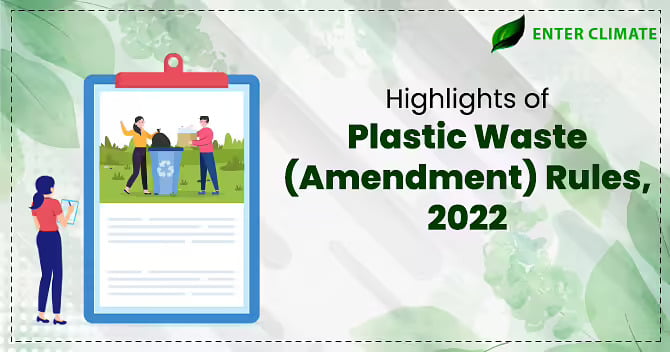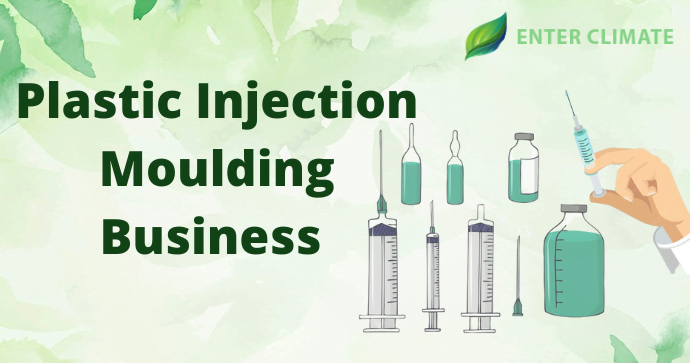Highlights of Plastic Waste (Amendment) Rules, 2022
 22 Aug, 2022
22 Aug, 2022 
According to estimates, as of right now, India produces over 400 million tonnes of plastic waste annually, and by 2050, that number is expected to rise to almost 1,100 million tonnes, the bulk of which are single-use plastic items. According to estimates from the central pollution control board, India produces over 26,000 tonnes of plastic waste every day.
With this much plastic waste production, it became mandatory for the government to strengthen the legislation and redefine the producers’ responsibility in order to curb the influx of plastic waste.
Evolution of the Plastic Waste Management Rules in India
The different plastic waste management rules across the years: –
- Recycled Plastic Usage Rules, 1998
- The Plastic Manufacture, sales and usage Rules, 1999
- Recycled Plastics Manufacture and Usage (Amendments) Rules, 2003
- Draft Plastics (Manufacture, Usage and Waste Management) Rules, 2009
- Plastic Waste (Management and Handling) Rules, 2011
- Plastic Waste Management Rules, 2016[1]
- Plastic Waste Management (Amendment) Rules, 2016
- Plastic Waste Management (Amendment) Rules, 2021
- Plastic Waste Management (Second Amendment) Rules, 2021
- Plastic Waste Management (Amendment) Rules, 2022
The Plastic Waste (Management) 2016
The Plastic Waste (Management) 2016 was enacted with an objective to delegate the liabilities to Producers and generators for plastic waste management and collect back the plastic waste as part of their Extended Producers’ Responsibility. These Rules also encourage the use of Plastic Waste for infrastructure construction as per the Indian Road Congress Guidelines, or Energy recovery or waste to oil etc., for sustainable use of waste.
Need for Amendment
The Ministry Of Environment, Forest and Climate Change, on February 16, 2022, redefined Extended Producers’ Responsibility for Plastic Packaging. This modification was made to align with the change in the economy from a linear to a circular economy. The linear economy is based on the principle of take-make-use-dispose, where proper management of plastic waste is not taken into consideration damaging the environment further. Whereas in the circular economy, the sustainable development model is used where the product is recycled and reused, after which it is disposed of in a manner that guarantees minimum environmental damage. The change in the legislature was also introduced to best complement the sustainable development goals formulated by United Nations.
Fundamental changes in the Plastic Waste (Management) Rules
Some of the key points that were introduced in Plastic Waste (Management) Rules: –
- Listing the entities that are mandated by Extended Producers’ Responsibility under Plastic Waste (Management) Rules to get the mandatory registration from the official site of the Central Pollution Control Board. The list of the entities is: –
- Plastic Waste Processors
- Producers’/Manufacturers of the Plastic packaging
- Importer of plastic packaging of imported products/ importer plastic packaging
- Brand Owners which do not fall under the category of micro and small enterprises mandated by the Ministry of Micro, Small and Medium Enterprises, Government of India, which includes online platforms, marketplaces and supermarkets/retail chains
- Further, Plastic Waste (Management) Rules also list the responsibility of PIBO (Producers’/Importers/Brand Owners), which include mandatory registration and formulating an Extended Producers’ Responsibility Action plan in accordance with the standard operating procedure developed by the Central Pollution Control Board.
- The amendment of the Plastic Waste (Management) Rules also redefines the extent of Extended Producers’ Responsibility, covering: –
- Category I- Plastic packaging that is of rigid nature like whip cream cans, pickle jars, wine bottles, and yoghurt containers;
- Category II- plastic packaging of single layer or multilayer that are flexible (more than one layer with different types of plastic). These include plastic sheets or like and covers made of carrying bags, plastic sheets, pouches or plastic sachets;
- Category III- Multi-layered plastic packaging with at least one layer of plastic and at least one layer of material other than plastic;
- Category IV- the Plastic sheet or like used for wrapping as well as carry bags made of compostable plastics.
- The amendment also introduced the Extended Producers’ Responsibility targets for PIBO (Producers’/Importers/Brand Owners) which are decided on the basis of category and calculated according to the formula and annexure given at the end of the schedule under the Plastic Waste (Management) Rules.
- The Central Pollution Control Board also have been directed to establish an online portal for registration as well as for filing the yearly reports by PIBO (Producers’/Importers/Brand Owners) as well as by Plastic Waste Processor of Plastic packaging waste.
- Another amendment that is introduced related to the imposition of fines on PIBO (Producers’/Importers/Brand Owners) as well as on Plastic Waste Processorin case the extended Producers’ Responsibility target is not met. Regarding the Compensation, the Central Pollution Control Board will collect the fine from PIBO (Producers’/Importers/Brand Owners) and Plastic Waste Processor who are operating in more than two states, whereas PIBO (Producers’/Importers/Brand Owners) and Plastic Waste Processor operating in one state will pay compensation to the State Pollution Control Board of that particular state.
- The rule also mandates the formation/constitution of a committee by the Central Pollution Control Board under the chairmanship of the Chairman of the Central Pollution Control Board in order to recommend the policies to the Ministry of Environment, Forest and Climate Change regarding the effective implementation of Extended Producer Responsibility. The committee will include a representative from competent authorities such as: –
- Ministry Micro, Small and Medium Enterprises
- Ministry of Housing and Urban, Affairs Department of Chemical and Petrochemicals,
- Ministry of Housing and Urban Affairs
- National Environmental Engineering Research Institute
- Central Institute of Plastic Engineering and Technology
- Department of Drinking Water and Sanitation
- three State Pollution Control Boards or Pollution Control Committee,
- Three industry associations as decided by the committee’s chairperson
- At last, the rules also mandate the development of collection and segregation infrastructure of plastic packaging waste that is segregated into different categories. The stakeholders that are involved in the process of waste collection will transport the waste for treatment and recycling to a registered recycler.
Conclusion
With the introduction of an amendment in Plastic Waste Management Rules, the procedure to file for registration or filing annual reports by PIBO (Producers’/Importers/Brand Owners), as well as Plastic Waste Processor, has become easier and accessible through an online portal. This will work as an advantage in encouraging the Producers’ to get the registration without much hassle.
Read our Article:How to Set Up a Plastic Bottle Manufacturing Business in India













